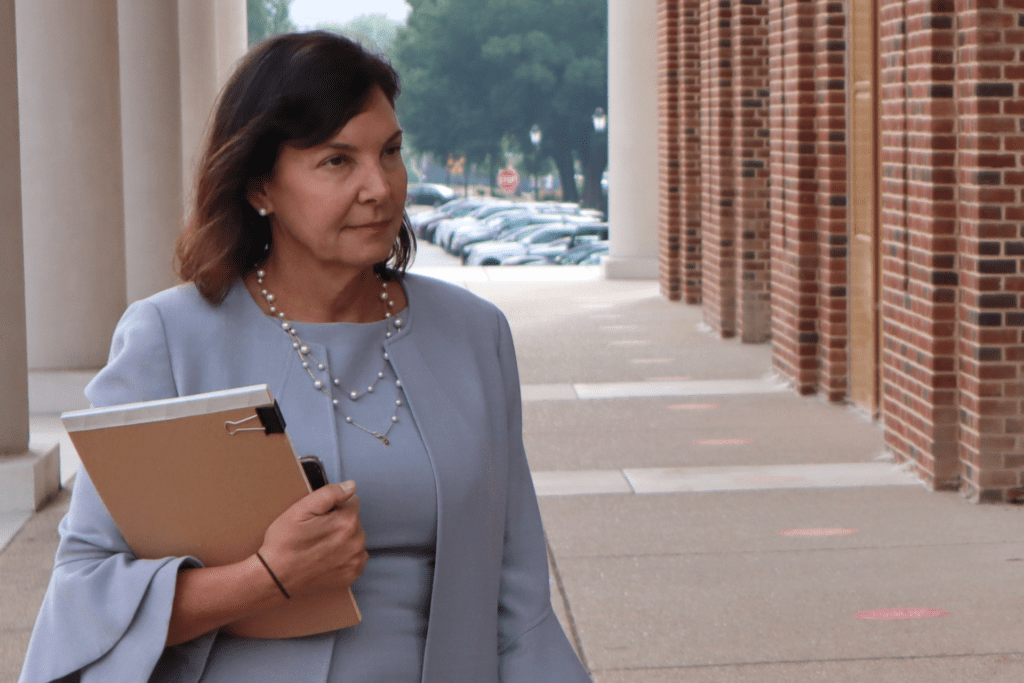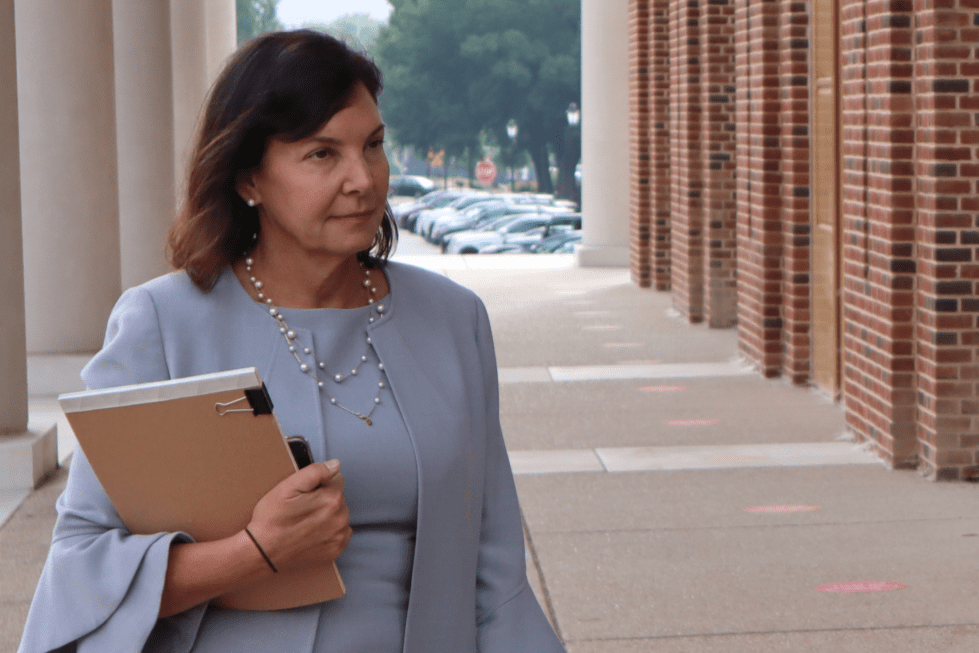

STATE AUDITOR KATHLEEN MCGUINESS ENTERs THE KENT COUNTY COURTHOUSE IN DOVER ON JUNE 24, 2022. (CHARLIE MEGGINSON/DELAWARE LIVE)
Shortly after Senate Democrats introduced a resolution to hold a hearing on State Auditor Kathleen McGuiness’ removal from office, House Democrats sent a letter saying Gov. John Carney could remove McGuiness unilaterally.
McGuiness was found guilty in June on charges of official misconduct, structuring and conflict of interest.
All three charges are misdemeanors.
The jury of 12 Kent County residents acquitted McGuiness on charges of theft and intimidation, both felonies, after a three-week trial.
McGuiness has refused calls to step down and is actively seeking re-election.
In a statement made through her attorney, McGuiness said those seeking her removal in the General Assembly are rushing to judgment as the judge in her trial has not yet finalized the jury’s verdict.
Senate leadership wants to hold a hearing to vote for Carney to remove McGuiness from office.
House leadership says the clearest and most direct path to removing the state auditor is by waiting for the judge to finalize the jury’s verdict, after which Carney can single-handedly remove her from office.
Carney seems to agree with House leadership.
Senate’s preferred method: Hold a hearing
The Senate’s resolution says the General Assembly should meet to decide whether reasonable cause exists for Gov. John Carney to remove McGuiness.
The General Assembly will have to convene a special session to vote on the resolution. If the resolution passes in both chambers, a joint session of the General Assembly will hold a hearing to ask Carney to remove McGuiness 10 days or more after the resolution’s passage.
The Senate cites Article III, Section 13 of the Delaware Consitution, which says:
“The Governor may for any reasonable cause remove any officer, except the Lieutenant-Governor and members of the General Assembly, upon the address of two-thirds of all the members elected to each House of the General Assembly…The person against whom the General Assembly may be about to proceed shall receive notice thereof, accompanied with the cause alleged for his or her removal, at least ten days before the day on which either House of the General Assembly shall act thereon.”
The Senate’s resolution requires a simple majority to pass. To ask the governor to remove McGuiness requires a two-thirds vote in both chambers.
According to an advisory opinion issued by the Supreme Court in March, the hearing “preferably would include the right [for McGuiness] to attend, be represented by counsel, call witnesses, and introduce evidence.”
That could mean a days- or even weeks-long public spectacle during which McGuiness’ legal counsel could essentially rehash her entire trial, not in a court of law, but in the General Assembly.
The House would prefer not to go down that road
Democratic House leaders on Friday sent a letter to Carney saying they believe there’s an easier way to remove McGuiness from office.
Article XV, Section 6 of the Delaware Constitution states: “The Governor shall remove from office any public officer convicted of misbehavior in office or of any infamous crime.”
“As elected officials, we take the oath of office all of us have sworn to uphold very seriously, putting the best interests of the state and its people above all personal or special interests,” the letter to Carney says. “Ethical behavior and adhering to the law are paramount to an elected official maintaining public trust, especially those in a statewide office tasked with serving as a financial watchdog.”
The letter says McGuiness’ crimes meet the constitutional criteria of “misbehavior in office,” and as a result, Carney is obligated to remove her from office once the judge in the McGuiness case finalizes the jury’s verdict.
“The legislative process defined in Article III, Section 13 of the Delaware Constitution requires a 2/3 vote of both chambers of the General Assembly to ask the governor to remove a public official,” said House Majority Leader Valerie Longhurst, D-Delaware City. “The governor, under that section of the law, may – not must – remove the official.”
Indeed, the Supreme Court’s March advisory opinion says that the Senate’s preferred method does not require the governor to remove an official after being asked by the General Assembly.
“As our review of the Delaware and Pennsylvania debates shows, a bill of address — with its reasonable cause requirement — was intended to cast a wider net and covers misconduct by public officials that might lead to criminal charges but not necessarily end in a criminal conviction,” the opinion reads.
When the framers of Delaware’s Constitution were considering the issue of removal from office, they decided that an officer who has been convicted in a court of law must be removed from office.
“The Delaware Delegates first discussed requiring removal from office if an officer had been ‘convict[ed] of misbehavior in office or of any infamous crime’ and agreed that when an individual has ‘had his day in Court, and he has been indicted and he has been convicted,’ ‘he certainly ought to come out of office.’ The Governor was therefore required, under the new Constitution, to remove any officer who has been convicted.”
Longhurst and fellow House Democratic leaders believe that the text is unambiguous here: If the judge in the McGuiness trial affirms the jury’s guilty verdicts, the Constitution leaves Carney no choice but to remove McGuiness unilaterally.
Longhurst said the Senate’s preferred method — having the legislature ask Carney to remove McGuiness — would not require Carney to remove her from office.
The House’s preferred method is the “clearest and most direct path to removing the state auditor,” she said.
McGuiness’ fate isn’t yet sealed
While the jury has submitted a guilty verdict on three of the five charges McGuiness faced, the presiding judge in her trial still has not entered a judgment of conviction.
After the prosecution rested its case during the McGuiness trial, defense attorney Steve Wood asked Superior Court Judge William Carpenter to issue a judgment of acquittal on each of the five charges against McGuiness.
Carpenter decided to reserve judgment until after the jury came to a verdict. His choices were to grant the motion, partially grant the motion, reserve judgment or deny the motion.
Had the jury acquitted McGuiness on all five charges, Wood’s request would have been moot and Carpenter wouldn’t have had to make a decision.
Because the jury rendered a guilty verdict on three of the five charges, Carpenter could still grant Wood’s motions and acquit her if he feels the prosecution didn’t prove the elements of the crime.
Carpenter is expected to rule on those motions next week.
Carney seems to agree with House leadership
In a statement last week, Gov. John Carney said “it is the Governor’s responsibility under the law to await the final determination of the court and then to determine his constitutional obligations after the entry of judgment.”
The Senate’s preferred method doesn’t require them to wait until the judge enters a verdict, but if they proceed with a hearing and Carpenter overrules the jury’s verdict, they could be left with pie in their faces.
The Senate could wait until the judge enters a verdict and then pursue a hearing, but they’ve chosen not to do that.
“With the stroke of a pen, the governor can fulfill his constitutional obligation and remove the state auditor from office,” Longhurst said. “The governor has publicly stated that he believes the auditor cannot continue to serve in her position and that he is waiting for the Superior Court to enter the verdict before fulfilling his duty.”
McGuiness responds
Letter from House leadership to Gov. John Carney on McGuiness removal:
Senate resolution to hold hearing on McGuiness removal:
Supreme Court’s Advisory Opinion


Charlie Megginson covers government and politics for Delaware LIVE News. Reach him at (302) 344-8293 or [email protected]. Follow him on Twitter @cmegginson4.
Share this Post



